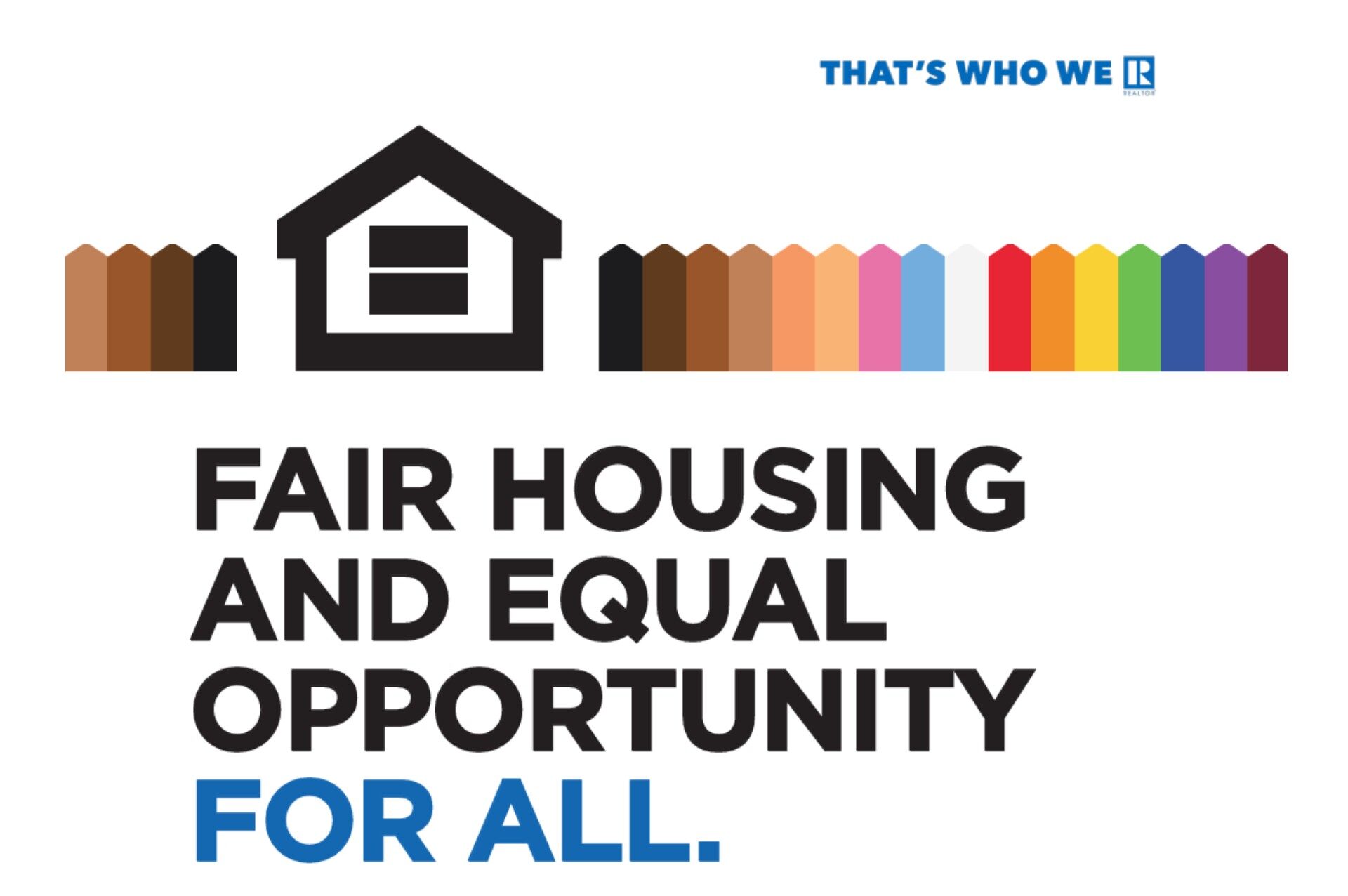The Realtors® Fair Housing Action Plan
The Realtors® Fair Housing Action Plan, emphasizes accountability, culture change, and training, to advance fair housing in the industry.

Accountability
We raise awareness for, deepen understanding of, and hold ourselves accountable to fighting the challenges associated with fair housing.
Housing Affordability
We promote public policy to advance broader homeownership availability, accessibility, and affordability in all communities.
Closing the Gap
We prioritize efforts to narrow homeownership gaps among demographic groups and promote strong enforcement of anti-discrimination laws in the housing market.
NAR Fair Housing Requirement
Every three years, Realtors® are required to complete Fair Housing and Code of Ethics trainings. NVAR’s Realtor® School Fair Housing and Ethics CE and PL courses can count for this requirement!

Realtors® are Committed to Fair Housing
NVAR is no stranger to the housing discrimination that occurs throughout the nation. To counter this, we host regular Fair Housing trainings, events, and forums, to help bridge the divide and promote equity and awareness. Want to show your commitment to Fair Housing? Download the Equal Housing Opportunity Logo below and include it in your branding.


Thomas Daley
NVAR Public Policy Committee
“Our Association’s commitment to fair housing and DEI education and advocacy is absolute. Our goal is to lead by example today, so we can help deliver on everyone’s hope to participate in the American Dream of homeownership.”
Fair Housing Policy Priorities
Realtors® are sworn to uphold a strict Code of Ethics, treating all clients equally, regardless of their race, color, religion, sex, handicap, familial status, national origin, sexual orientation, or gender identity. The Realtor® commitment to diversity and equality is perhaps the strongest in real estate, even going a step further than the federal Fair Housing Act, which does not include sexual orientation and gender identity as protected classes against housing discrimination.
NVAR has a long history of zero tolerance for Fair Housing violations and disparate treatment. Localities throughout Northern Virginia conduct fair housing testing to identify these discriminatory practices in the rental, sales, and lending markets. As NVAR’s Realtors® pledge to conduct business in keeping with the Code of Ethics, the Association is committed to being part of the solution. We have a demonstrated track record of leadership in Fair Housing, and we will continue to strengthen this proven record by partnering with localities in identifying and eliminating discrimination. NVAR supports fair housing testing and encourages our local governments to continue this effort while utilizing NVAR as a source for education and outreach on this issue. NVAR is committed to creating more fair housing activity within our membership. We are dedicated to creating a vibrant culture of belonging that fosters collaboration and success, supporting the principles of diversity, equity, and inclusion. NVAR hosts regular Realtor® trainings, increasing awareness of implicit bias and recognition of the impact of discrimination in housing.
State and local governments receiving funds from the U.S. Department of Housing and Urban Development (HUD) must submit a fair housing plan. Instead of creating separate plans, eight communities joined together and worked with Public Housing Authorities (PHAs) and others on a regional plan. The result is the Metropolitan Washington Regional Analysis of Impediments to Fair Housing Choice. Each local government must approve it before it is sent to HUD.
As part of this plan, each locality in the region will adopt policy goals to help achieve fair housing. One such goal is to incorporate a fair housing analysis into the review of significant rezoning proposals and specific plans. Several large new developments in the region have not sufficiently addressed the needs of members of protected classes who have been displaced or priced out of the area. Incorporating a fair housing analysis in the review process for these plans could reduce displacement and other negative impacts for members of protected classes. NVAR supports adoption of a fair housing equity analysis process into local decisions, where the provision of affordable housing, avoiding displacement of existing residents, and creating access to opportunity for all are priorities.
In 2021, the Virginia General Assembly adopted a new section of the Virginia Fair Housing Act that prohibits a local government, its employees, or commissions from discriminating in the application of local land use ordinances or permitting of housing developments based on the real or perceived income level of the expected occupants if their income is at or below 80 percent of the area median income (AMI). The section further states that “It shall not be a violation of this chapter if land use decisions or decisions relating to the permitting of housing developments are based upon considerations of limiting high concentrations of affordable housing.”
While well intended to prevent concentrated areas of low-income housing, this final sentence is vague enough as to render the preceding prohibition meaningless. Localities can use an unquantified threshold of “high concentration of affordable housing” to circumvent the fair housing prohibition.
Furthermore, local governments already have tools at their disposal to prevent the concentration of affordable housing by using comprehensive plans and zoning code ordinances. As a result, this clause is duplicative at best and detrimental to the development of affordable housing at worst.
NVAR supports legislation to either strike “It shall not be a violation of this chapter if land use decisions or decisions relating to the permitting of housing developments are based upon considerations of limiting high concentrations of affordable housing” or defining in specific terms what “high concentration of affordable housing” means in order to prevent the sentence from being used as a loophole.
Realtors® support reauthorizing and increasing funding for HUD fair housing enforcement programs. Recent testing investigations show there is still widespread discrimination in the housing market. We must be more proactive in uncovering and investigating fair housing violations. An enforcement system that relies solely on complaints will miss most fair housing violations.
Congress should support legislation that closes the homeownership gaps among demographic groups and reauthorize and increase funding for HUD’s fair housing enforcement grant programs.
In 2021, the Virginia General Assembly adopted a new section of the Virginia Fair Housing Act that prohibits a local government, its employees, or commissions from discriminating in the application of local land use ordinances or permitting of housing developments based on the real or perceived income level of the expected occupants if their income is at or below 80 percent of the area median income (AMI). The section further states that “It shall not be a violation of this chapter if land use decisions or decisions relating to the permitting of housing developments are based upon considerations of limiting high concentrations of affordable housing.”
While well intended to prevent concentrated areas of low-income housing, this final sentence is vague enough as to render the preceding prohibition meaningless. Localities can use an unquantified threshold of “high concentration of affordable housing” to circumvent the fair housing prohibition.
Furthermore, local governments already have tools at their disposal to prevent the concentration of affordable housing by using comprehensive plans and zoning code ordinances. As a result, this clause is duplicative at best and detrimental to the development of affordable housing at worst.
NVAR supports legislation to either strike “It shall not be a violation of this chapter if land use decisions or decisions relating to the permitting of housing developments are based upon considerations of limiting high concentrations of affordable housing” or defining in specific terms what “high concentration of affordable housing” means in order to prevent the sentence from being used as a loophole.
Realtors® support reauthorizing and increasing funding for HUD fair housing enforcement programs. Recent testing investigations show there is still widespread discrimination in the housing market. We must be more proactive in uncovering and investigating fair housing violations. An enforcement system that relies solely on complaints will miss most fair housing violations.
Congress should support legislation that closes the homeownership gaps among demographic groups and reauthorize and increase funding for HUD’s fair housing enforcement grant programs.
Steering
Racial/ethnic steering refers to the practice among real estate professionals to guide prospective home buyers towards or away from certain neighborhoods based on their race or ethnicity. Read this NAR article: Steering, Schools, and Equal Professional Service
Segregation
Segregation that exists as a result of specific laws or legally recognized practices is called de jure segregation. De facto segregation occurs not as a result of specific laws but through other voluntary actions taken by individuals and organizations.
Bias
Explicit bias involves attitudes and beliefs that people hold about a person or a group on a conscious level. These biases—and the expressions of explicit bias (e.g. discrimination, hate speech)—often arise as the result of a perceived threat. Implicit bias, by contrast, refers to attitudes or stereotypes that shape people’s actions and decisions in an unconscious manner.
Disparate Impact
Disparate impact or discriminatory effects refers to a policy or practice which affects a protected class of people even if there is no discriminatory motive.
Learn More
Housing discrimination can happen in the process of renting, buying, selling or getting a loan for a home. It also includes discrimination that denies someone the use or enjoyment of their home. Learn more about the various types of discriminations that can occur and how they are defined here.
Download the Fairfax County Fair Housing Flyer here
NVAR is committed to respecting and celebrating that diversity in everything we do. Below are a few resources that you may find useful.
– Fair Housing Terms
– Tips for Working with Differently Abled Individuals
– Virginia Housing
– Northern Virginia Affordable Housing Alliance (NVAHA)
– Fairfax County Housing and Community Development
– Arlington Housing Division
– Alexandria Office of Housing
